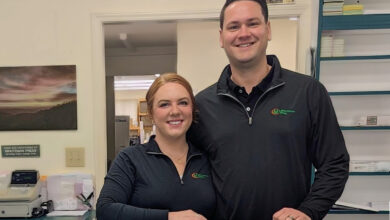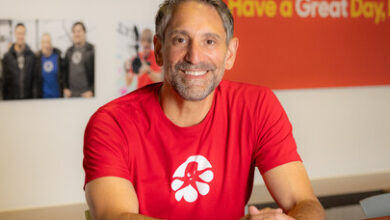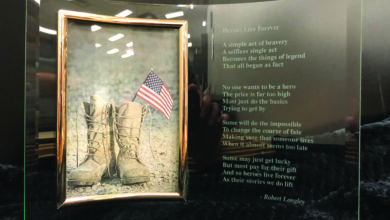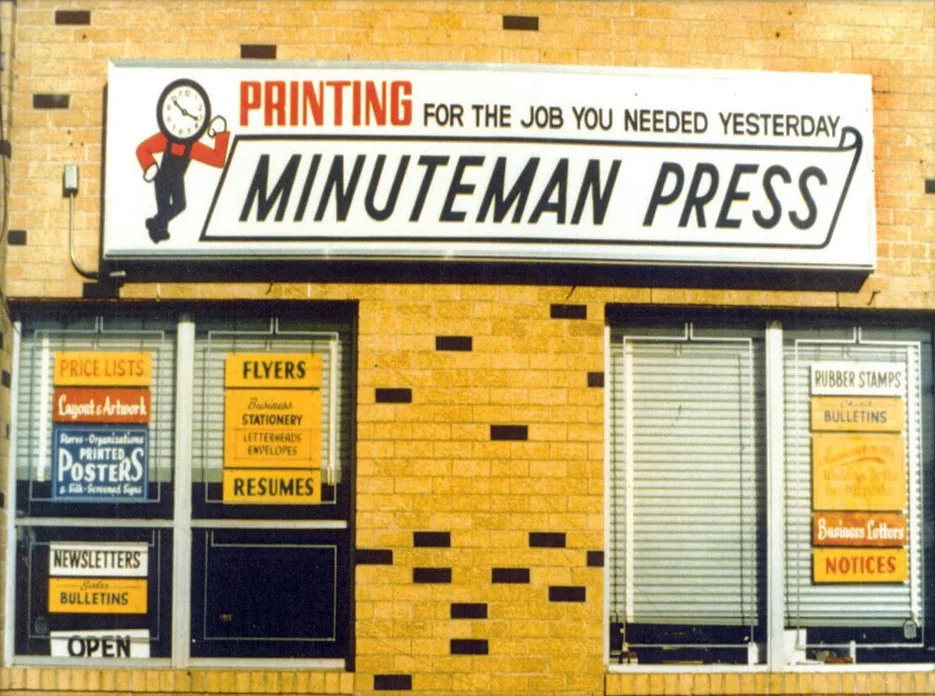
Minuteman Press International is proud to celebrate 50 years in business! The first Minuteman Press center opened in Plainview, New York, in 1973. Roy Titus, founder of Minuteman Press, along with his son Bob Titus, decided to open the shop after running a successful operation for Parent’s Magazine. While working with other printers for Parent’s Magazine, Roy realized that the printing industry was a huge market that had untapped potential.
In 1973, that first Plainview shop served as a quick printing operation that filled the need for one-color, short-run orders that needed to be done fast. From there, Roy tapped into the potential of the industry, creating the first one-stop Minuteman Press design, marketing, and printing center. Products and capabilities expanded, and over the past 50 years, Minuteman Press has continued to be at the forefront of the printing industry.
It all started with that first Plainview shop in 1973, where Roy, along with his son Bob and childhood friends Jim Galasso and Dave Scadin, laid the foundation for the worldwide franchisor that Minuteman Press International is today.
Bob Titus, who remains CEO today, shares his thoughts, experiences, and memories of what it was like laying the groundwork in 1973.
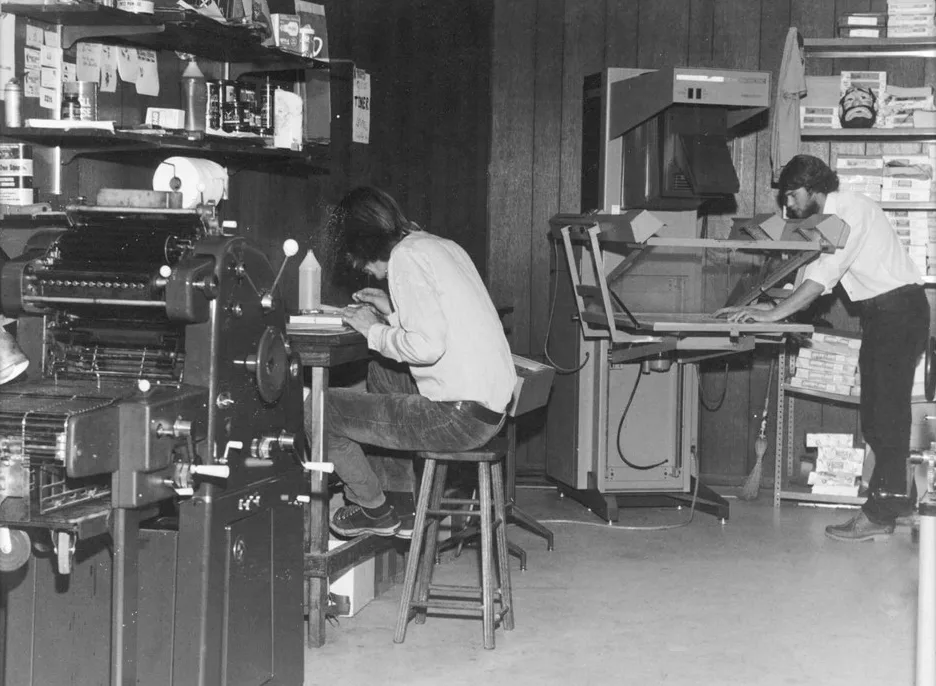
What was it like working in the Plainview shop in 1973?
BT: Jimmy Galasso and I ran the shop together, and a couple of months later, we brought in Dave Scadin. I have known both of them since I was six years old. I came home from college, and Jimmy was working at a sporting goods store. He came to our house, and when my dad offered him the job, he said yes. We needed someone else down the road, and that’s when Dave joined us after working for the Town of Oyster Bay.
Originally, Dave was making deliveries for us, but one day our press broke. Dave came into the shop and told us to get out of the way. He fixed the press, and from that point forward, he was our press operator.
Over the years, we’ve had 36 people from Oyster Bay High School and St. Dominic’s High School work with us. It all stemmed from us as childhood friends working together and then expanding from there. It’s been an incredible ride.
What was it like working with your dad Roy Titus? How did you get started running the shop?
BT: My dad and I didn’t work in the shop together, but he would come in and give us great ideas. He was really smart and did things like start our marketing program and add pickup and delivery as a service to our customers.
For me, this all started with my dad hiring an old-time printer named Tom, who taught me and Jimmy Galasso how to run the press and do bindery work. One day, a real estate customer came into the Plainview shop, and my dad happened to be there. They wanted flyers printed and delivered down the street to their office once the job was done. Tom said we don’t do delivery, and my dad stepped in and said that yes, we’ll deliver the job once it’s finished.
Tom said we wouldn’t want to get into delivery, and Roy disagreed. My dad saw this as a great service we could provide that would make it easy for customers to do business with us. He also decided that we don’t have to wait for customers to come in and that we can go to the customers ourselves.
At the time, the huge commercial printers were looking for home-run clients, and they were not going door to door. We started going door to door, starting in the retail area, and we were picking up business.
The two biggest things we did to really get the shop going strong were:
- Marketing to the customers, going to them, and not waiting for them to come to us;
- Adding pickup and delivery options at a time when others just weren’t doing that.
My dad always told us to never say no to the customer. No matter what the customer wants, get it for them.
– Bob Titus
How did Minuteman Press originally grow from there into a franchise?
BT: First, our Plainview shop went from an AB Dick 1-color press to an older Multi-Graphic Press that really improved the quality of the work we were doing. When we opened the second Farmingdale store, we purchased a new Multi-Graphic Press along with our first 3M camera, which led to us implementing the franchise model for other shops.
We found that the 3M company invented the plastic plate camera, where the plastic plates would cost about the same as a paper platemaker. The plastic plates allowed for metal plate quality that wouldn’t stretch and allowed for 2-color printing. The salesman told us the camera could help us produce 2, 3, and 4-color printing with plastic plates that don’t stretch like paper plates, and he was right. The cameras did everything the salesman said they could do.
We first hired Mike Jutt as our press operator for the Farmingdale shop, where we first used the press with the 3M camera. He did a great job, and the Farmingdale center became the prototype for the Minuteman Press franchise. When we started franchising, we asked Mike to create a training program to teach the owners our system. He created and implemented the training program, and he’s done an absolutely fabulous job for 50 years. Mike ultimately became our executive VP & director of training and is still going strong today.
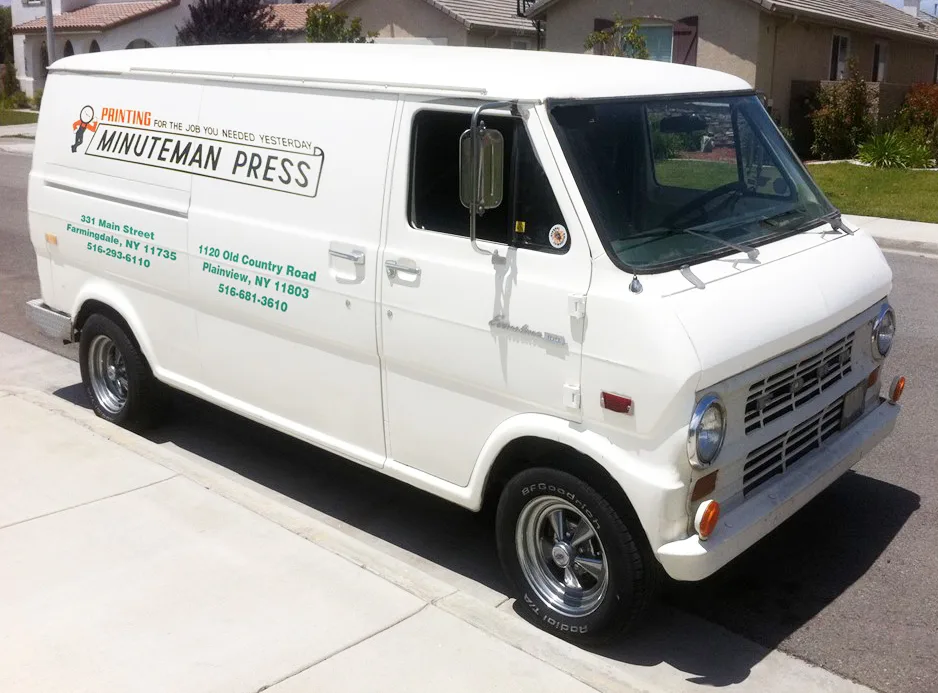
Storytime: Community involvement
I want to share one quick story from our Farmingdale shop. This speaks to the importance of being involved in the community and joining local clubs and organizations. At that time, Farmingdale merchants held their Hardscrabble Day. Families would come to the event, and one year, they needed to hire a clown at the last minute. My dad volunteered to pay for the clown, who would blow up balloons for the kids and put smiles on their faces. The families were happy, the merchants saw us as saviors for stepping in to help, and many of them started using us for their printing. That $50 investment and ‘saving the day’ lead to a lot of business.
Because the press and camera worked so well in Farmingdale, my dad ordered another one for our Plainview shop and then a third one. When the head honchos at 3M saw that we had purchased three cameras in six months, they paid us a visit to see what we were doing. On their end, they were having trouble selling the cameras because other printers were reluctant to change. They said we had a terrific idea for using these cameras and suggested we franchise.
3M really believed in our concept and our program, and so they offered financing to new owners. They allowed the owners to form a shell corporation so that they wouldn’t have personal liability. We then went to a franchise show at the New York Coliseum, just looking to put people into business in the Tri-State Area, and we would support those owners.
At that show, we had one prospect who wanted to open in Boston, and another one who wanted to open in Los Angeles. At first, we said no to going out of state, but they were persistent. At that point, my dad reached out to six quality people who had worked for him in the past, who had sons that were around my age. My dad felt this would be a great business for a father and son, and he was able to hire them.
He had them go to six different cities – Boston, Cleveland, Chicago, Atlanta, Denver, and Los Angeles – and hire a press operator. They ran these Minuteman Press shops with the press and 3M cameras, and followed our business model. Then, they franchised and supported the new stores that opened around them while also working in their own shops.
As these cities expanded with more franchises, we could no longer run our own stores while supporting the new owners. That is when we made the decision to sell those original shops we owned and support the owners full-time. We had the press operator, the marketing person, and the regional vice president for those locations, and that’s how our local support teams were originally formed.
Ultimately, we sold hundreds of 3M cameras, and they also were able to sell the ancillary materials needed for those cameras. This really helped us get going as a franchise, and the company-owned stores became profitable very quickly because of the new marketing program we introduced. As we generated more and more business and sold those satellite stores, that’s how we created the support teams that laid the groundwork for our regional teams today.
What are some of the key ways that Minuteman Press has evolved over the years?
BT: One of the biggest changes we’ve ever made was when my dad introduced the royalty cap to our owners around 1977-78. The owners thought we were crazy, but what happened is that this really incentivized our owners to sell more and more. At the time, we saw owners who were making $15,000/month at the time start selling $20,000, $30,000, $40,000, and $50,000.
My dad sent them a letter and told them to act as if you’re paying the full royalties and use that money to reinvest and build the business. Many of our owners bought into this idea. They appreciated the royalty cap but also understood how important it was to hire that extra marketing person or add that piece of equipment, etc.
We started this business by filling a void for our clients. To this day, we continue to fill that void in different areas that make sense and meet their needs.
-Bob Titus
Is there anything else you’d like to share?
BT: My dad was president of Minuteman Press for the first 20 years, and we were in pure growth mode in terms of opening new franchise locations. We expanded from the U.S. into Canada, and I even ran the Toronto office for two years.
For the next 25 years of our history, I was president of the company. We expanded even further internationally to the U.K., Australia, and South Africa. I felt that my job was to improve on existing services and add services that made the most sense for our owners. We would conduct studies and see what’s next, then implement new items to benefit our owners. In everything we did and still do, we always try to think of how we can best help them.
For over three years now, my son Nick has been president of the company. He took over for me just three months before the pandemic. Looking back on it now, this is one of the best decisions we made to elevate him to president when we did. There is no way I could have carried us through the way he did. Everything he did and everything our team did was just tremendous. There were daily communications, the Bounce Back program, and so much hard work and dedication. His vision helped all of us adapt. Even though I already knew this, it just assured me that everybody was in great hands.
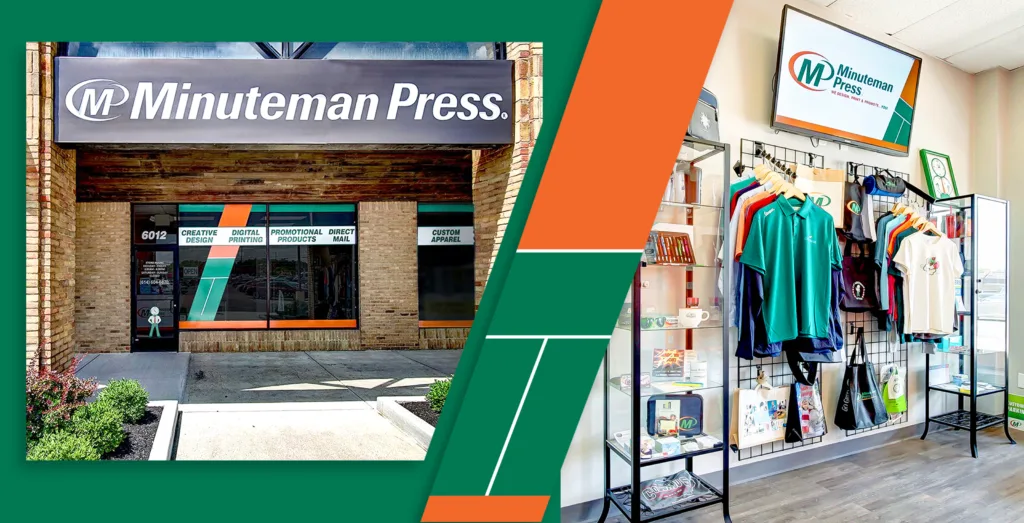
Final remarks
Bob concludes, “Looking back, I think of the longtime owners that helped us build the company. And then I think of every owner out there who has since helped us build, whether they realize it or not. We are all like family, and we’re in this together.”
He adds, “Let me also say that what makes me feel so gratified is when the business is turned over from parents to their kids. It’s always such a great feeling to see a business that people worked really hard to build carry through to the next generation. I know that from experience as both a son and a dad. Over 50 years… it’s certainly been an incredible ride.”

